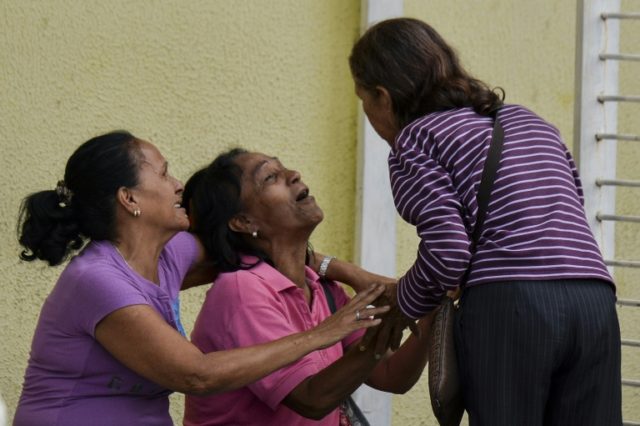The families of Venezuela’s political prisoners are awaiting anxiously on Friday for the government to release their loved ones, as promised late Thursday.
The regime vowed a release of political prisoners on Friday without identifying who they would release. Reports suggested that some prisoners of conscience were transferred out of the Helicoide prison in Caracas, believed to house the largest number of prisoners, but have not been freed.
Relatives and attorneys of the dissidents at the Helicoide have protested that the government has blocked them from visiting for the past two weeks.
The Helicoide prison was used to house U.S. hostage Joshua Holt for two years; loved ones of the Venezuelan prisoners say they have not been able to see their relatives since a revolt occurred that ultimately promoted Holt’s release.
Police arrested Holt and his wife, Thamara Caleño, in 2016 after reportedly planting weapons in their home. They stood accused of attempting to organize an armed insurrection against Maduro but were never properly indicted or placed on trial. Last week, following a revolt in the Helicoide that prompted Holt to publish videos on social media urging American officials to save him from what he believed to be a certain death, President Trump welcomed Holt to the White House, having traveled home with Senator Bob Corker.
Maduro appears to have used some of the good publicity from Holt’s release, and from his “victory” in a fraudulent election that banned opposition candidates on May 20, to repress the remaining political prisoners at the Helicoide further.
Among those imprisoned at the Helicoide are two recipients of the European Union’s Sakharov Prize for Freedom of Thought: opposition leader Laurent Saleh and former mayor of the western regional capital San Cristóbal, Daniel Ceballos.
Venezuelan officials promised to release several political prisoners on Friday, but did not specify who.
“Starting at noon we will begin this process through the Commission of Truth, which will identify beneficiaries from this group of people under legal action in Venezuela for crimes related to political violence,” Communication and Information Minister Jorge Rodríguez told reporters, according to Voice of America.
ÚLTIMA HORA | VIDEO – Jorge Rodríguez desde el Palacio de Miraflores tras reunión de Maduro con Gobernadores opositores: “Desde mañana a partir de las 12 del mediodía, comenzará el proceso de beneficios procesales para las liberaciones" de los presos políticos en Venezuela" pic.twitter.com/bwqbtGun1G
— AlbertoNews (@AlbertoRodNews) May 31, 2018
The Venezuelan socialist regime had not previously admitted that it had imprisoned political dissidents because of their beliefs.
Patricia Ceballos, Daniel Ceballos’ wife, told the independent newspaper El Nacional that she was told Ceballos had been transferred out of the Helicoide on Friday morning, but they did not tell her where. On Twitter, she demanded full freedom for all political prisoners.
“ATTENTION Venezuela a [secret police] commission transferred my husband Daniel Ceballos, we demand his FREEDOM and that of ALL political prisoners,” she wrote.
ATENCIÓN Venezuela una comisión del sebin trasladó a mi esposo @Daniel_Ceballos, exigimos su LIBERTAD plena y la de TODOS los presos políticos
— Patricia Ceballos (@PatrideCeballos) June 1, 2018
El Panorama, a Venezuelan outlet, citing unnamed “opposition sources,” listed Ceballos among those that may be released on Friday, as well as Popular Will party leader Leopoldo López, who remains in house arrest.
Yamile Saleh, the mother of Lorent Saleh, wrote on Twitter Thursday evening that she expected her son to be among those released and would be “at the doors of the Helicoide” early Friday to meet her son. Saleh has spent much of the past two weeks at the doors of the prison demanding to see her son.
Friday morning, an attorney representing political prisoner Gregory Sanabria told the Venezuelan outlet Runrunes that neither he nor the relatives of his client have been allowed to see Sanabria for two weeks.
The Venezuelan Penal Forum, an NGO that tracks politically-motivated arrests in the country, announced in May that the number of prisoners had increased in 2018. The group documented 357 individuals currently in prison in the country for having expressed opposition to the socialist regime. The NGO found in April that an 120-percent increase in the number of prisoners of conscience in the country in the past year.
Follow Frances Martel on Facebook and Twitter.

COMMENTS
Please let us know if you're having issues with commenting.